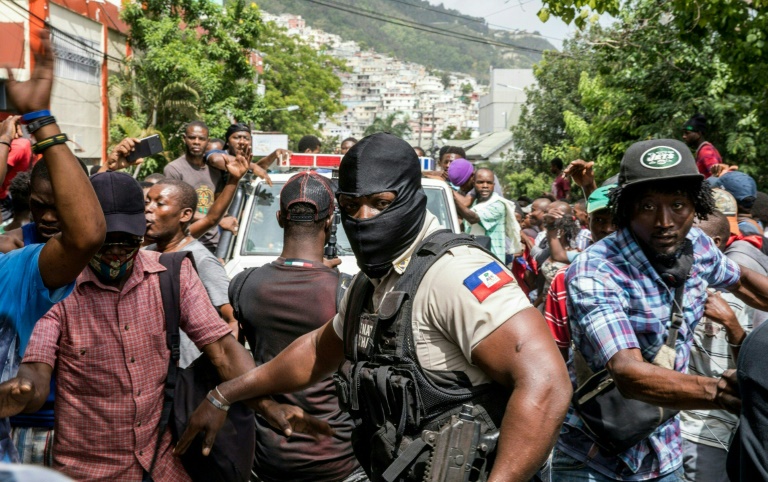Police in Haiti on Thursday hunted down suspects in the assassination of President Jovenel Moise, with one American among those arrested and growing questions over the role his security detail played as the country lurched into political chaos.
The poorest country in the Americas now has no president or working parliament and two men claiming to be in charge as prime minister.
The streets of the capital Port-au-Prince were tense and shops, banks and gas stations closed, with no immediate information on who killed the president or why. The main airport was also closed, as was the border with the Dominican Republic.
United Nations envoy to Haiti, Helen La Lime, speaking from the Haitian capital, said four members of a group that attacked the president’s private residence early Wednesday and shot him dead have been killed by police and six others were in custody.
“I’m also aware that a larger group of possible perpetrators have taken refuge in two buildings in the city and they are now surrounded by the police,” La Lime told journalists in New York via video conference.
Mathias Pierre, Haiti’s elections minister, said the arrested American was of Haitian origin, although he did not confirm press reports identifying the man as James Solages.
The US State Department said it could not confirm that any US citizen was arrested.
“Among the assailants, six are in the hands of the police,” National Police Director Leon Charles told a press conference.
“We already have the physical perpetrators in hand and we are looking for the instigators.”
Haiti has requested US assistance in its investigation, according to State Department spokesman Ned Price.
“We are aware of a Haitian National Police request for investigative assistance and the United States is responding,” Price told reporters.
Haiti is observing two weeks of mourning for the death of Moise.
– Where was his security? –
“Jovenel Moise was not terribly popular, but he was the president. He cannot be killed as if he were just an ordinary citizen,” said a 55-year-old man in Port-au-Prince, who gave his name only as Paul.
A 28-year-old woman named Julia said she was wary of the police claims that foreign mercenaries killed the president.
“Where were the well-equipped police who watch over the president night and day? Why didn’t they react?” she asked.
Prosecutors had the same question.
“I have given (police) the power to interview all the security agents close to President Jovenel Moise,” said Port-au-Prince government commissioner Bed-Ford Claude, a day after Moise was shot dead at his home in the capital.
“If you are responsible for the security of the president, where were you? What did you do to avoid this fate for the president?” Claude said.
In the Petionville neighborhood of the capital on Thursday, a crowd brought two men to a police station and called for them to be lynched.
In total, four men said to be in on the killing were being held at the police station, but it was not confirmed that they were actually suspects in the assassination.
Interim Prime Minister Claude Joseph has declared a national “state of siege” and said he was now in charge.
Joseph has only been in his post as prime minister for three months, and was due to step down within days after Moise named a replacement on Monday.
Joseph’s replacement, Ariel Henry, said Joseph “is no longer prime minister in my opinion.”
“Does a country have several prime ministers?” asked Henry.
Moise’s wounded wife, Martine, was rushed by air ambulance Miami. Joseph said her situation was stable.
During the assassination, a maid and another domestic staff member were reportedly tied up by the commandos.
– Political meltdown –
Haiti’s ambassador to Washington, Bocchit Edmond, said the killers were “professional” mercenaries disguised as US Drug Enforcement Administration agents.
Joseph on Wednesday said the president was “assassinated at his home by foreigners who spoke English and Spanish.”
The unpopular Moise had ruled Haiti by decree after legislative elections due in 2018 were delayed.
As well as presidential, legislative and local elections, Haiti was due to hold a constitutional referendum in September this year after it was twice postponed due to the coronavirus pandemic.
Moise, a successful businessman, campaigned for power as a populist and was sworn in on February 2017.
The end date of his mandate became the source of a standoff, as Moise maintained that his term of office ran until February 7, 2022, but others said it ended on February 7, 2021.
The disagreement arose after Moise was elected in a 2015 vote that was canceled for fraud, and then re-elected in November 2016.
Without a parliament, the country fell further into crisis in 2020.










